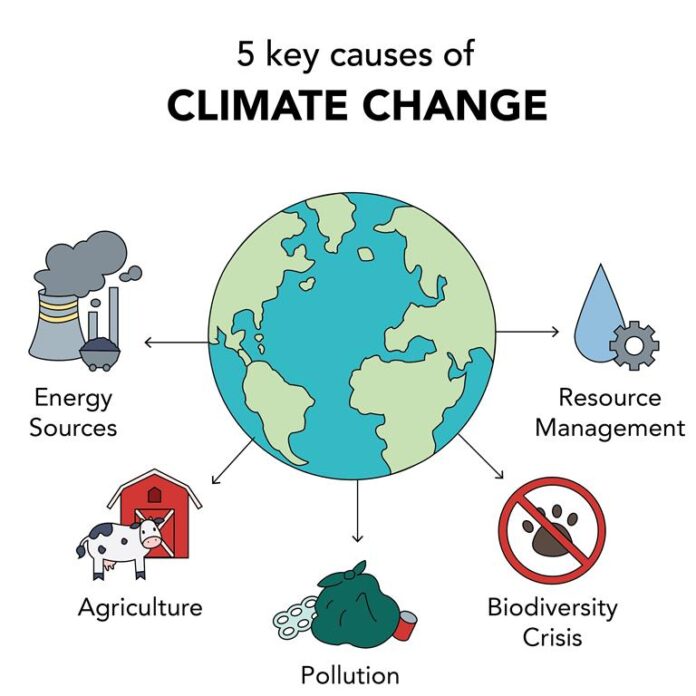Welcome to the third edition of The Environmentalist, your column for understanding the natural world. Today we will explore the causes of climate change.
Climate change isn’t a sudden phenomenon; it’s the result of decades of human activity and climate inaction. We must look around to find the key causes fuelling this global crisis. According to National Geographic,there are five key causes of climate change: how we get our energy, how we produce our food, loss of biodiversity, residue from human activity, and poor resource management.
Energy
We have heard about oil, coal, and natural gas — fossil fuels. When burnt, these release heat and provide different forms of power; this process produces carbon dioxide, which is the leading cause of climate change. Fossil fuels are responsible for nearly 90 per cent of these emissions. Fortunately, there are alternative ways to produce energy, but if we don’t start widely utilizing them soon, we will face severe environmental consequences.
Food & Biodiversity
What we eat matters — how it is produced and how it gets to our table. Beef and lamb release the largest amount of greenhouse gases (GHG); overfishing is a major contributor to the degradation of marine biodiversity; agriculture occupies half of the world’s habitable land, and is the leading cause of deforestation. Due to over-exploitation of soil, the agricultural frontier is always expanding, which also causes a loss of biodiversity, which is essential to support life on earth. Without a diverse range of species, ecosystems are not able to function, leading to severe changes in local areas that end up affecting weather patterns and economy!
Human Activity
Let’s talk about trash. Every year, approximately 11.2 billion tonnes of solid waste are collected worldwide, processed on land, thrown to the sea, or — the minority — recycled. The rise in global consumption makes experts believe that by 2050 we will be producing 70 per cent more trash. This is a concerning issue with major consequences. Dispersal of debris is polluting drinking water, making soil infertile, infusing microplastics into all living things, and increasing the risk of sickness in our population.
Resource Management
As a collective, we have poor natural resource management. We continue to forfeit our planet to sustain a lifestyle that will end up destroying itself. Still, it is important to talk about one of the most valuable resources we have on earth: water. Today, around two million people worldwide don’t have access to clean water. Moreover, the effects of our poor usage of water are altering the way that water moves through earth, having impacts on weather and leading to water-related climate disasters.
I know all this might be overwhelming, but individual and community action has a huge impact. It is the first step toward a better future.
The next edition of the The Environmentalist will go over what we can do to reduce negative impacts on this planet. As The Lorax once said, “Unless someone like you cares a whole awful lot, nothing is going to get better.” So, let’s care.


